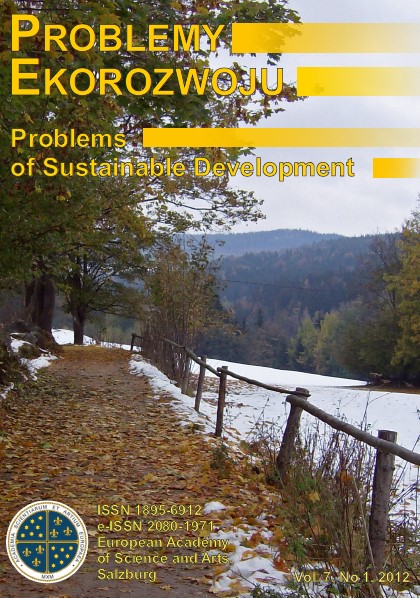Genealogy of Ecophilosophies
Article Sidebar
Issue Vol. 7 No. 1 (2012)
-
Genealogy of Ecophilosophies
Michael S. Pak7-13
-
Justice and Accountability as a Basis for Sustainable Development – the Case of International Environmental Law
Piotr Krajewski15-31
-
Sustainable Development and the Values we Share – Sustainability as the Confluence of Islamic and Western Frameworks
Paweł Bernat15-31
-
Social Marginalisation vs. Sustainable Development – Case of Homelessness
Paweł Rydzewski43-59
-
EURO 2012 vs. Sustainable Development
Zbigniew M. Karaczun61-75
-
Future prospects of Industrial Ecology as a Set of Tools for Sustainable Development
G Venkatesh77-80
-
A Novel Approach to Evaluating Sustainable Development
Zoran Radojicic, Sonja Isljamovic, Natasa Petrovic, Veljko Jeremic81-85
-
Determination of the Ecological-Economic Degree of Development in Countries of SE Europe – Weight Coefficients Technique
Mirjana Golušin, Olja Munitlak Ivanović, Larisa Jovanović, Siniša Domazet87-93
-
Henryk Skolimowski’s Ecophilosophy in the Aspect of Philosophy of History
Leszek Gawor95-103
-
The Jevons Effect and the Consumption of Energy in the European Union
Dariusz Pieńkowski105-116
-
Natura 2000 – the Opportunities and Dilemmas of the Rural Development within European Ecological Network
Artur Bołtromiuk117-128
-
Communiques of the State Environmental Council of Poland
EEAC annual conference 15-17 September 2011: Wroclaw, PolandTomasz Winnicki131-138
Archives
-
Vol. 9 No. 2
2014-07-01 16
-
Vol. 9 No. 1
2014-01-02 19
-
Vol. 8 No. 2
2013-07-01 13
-
Vol. 8 No. 1
2013-01-02 12
-
Vol. 7 No. 2
2012-07-02 14
-
Vol. 7 No. 1
2012-01-02 12
-
Vol. 6 No. 2
2011-07-01 19
-
Vol. 6 No. 1
2011-01-03 18
-
Vol. 5 No. 2
2010-07-01 21
-
Vol. 5 No. 1
2010-01-04 16
Main Article Content
Authors
Abstract
Environmentalism is not a recent movement, but one which dates from at least since the nineteenth century, and which has been subject to periods of contraction as well as growth. Moreover, the philosophical impulses underlying this movement have deep historical roots (and numerous antecedents) in the Western tradition. Broadly speaking, there have been two different traditions – schools – of environmental thought. The better known of these schools is one which the article identifies as the Arcadian, and which essentially represents a more up-to-date expression of the discontent with civilization and the desire for a return to the state of nature which have been characteristic of various Western philosophical traditions since antiquity. The other school, identified in this article as Utilitarian, which emphasizes the beneficial and less wasteful uses of nature with the help of science and technology, is now enjoying resurgence, but it also has deeper and broader historical and cultural roots than often suspected, as recent research has begun to show. Understanding the genealogy of these different types of ecophilosophies, in turn, helps us better discern, with the benefit of hindsight, their potential pitfalls as well as their likely contributions, and thus could lead to better informed philosophical discussions on environmental issues.
Keywords:
References
CARSON R., Silent Spring, Houghton Mifflin, Boston 1962.
CRONON W., Uncommon Ground: Rethinking the Human Place in Nature, Norton, New York 1995.
DYSON F., 2008, The Question of Global Warming, in: New York Review of Books, vol. 55 no. 10.
FLEMING D., 1972, Roots of the New Conservation Movement, in: Perspectives in American History, vol. 6, p. 7-91.
GUHA R., Environmentalism: A Global History, Longman, New York 2000.
LEOPOLD A., 1933, The Conservation Ethic, in: Journal of Forestry, vol. 31 no. 6, p. 634-643.
LÉVI-STRAUSS C., La Pensée Sauvage, Plon, Paris 1962.
LOVEJOY A., BOAS G., Primitivism and Related Ideas in Antiquity, Johns Hopkins, Baltmore and London, 1935.
MARSH G., Man and Nature, Charles Scribner, New York 1964.
MERCHANT C. Reinventing Eden: The Fate of Nature in Western Culture, Routledge, New York 2004.
MINTEER B., The Landscape of Reform: Civic Pragmatism and Environmental Thought in America, MIT, Cambridge 2006.
PAK M., 2011, Environmentalism Then and Now: From Fears to Opportunities, 1970-2010, in: Environmental Science & Technology, vol. 45 no. 1, p. 5-9.
PAWLOWSKI A., Sustainable Development as a Civilizational Revolution: A Multidisciplinary Approach to the Challenges of the 21st Century, CRC Press 2011.
RADKAU J., Nature and Power: A Global History of the Environment, Cambridge UP 2008.
STOLL M., 2011, ‘Sagacious’ Bernard Palissy: Pinchot, Marsh, and the Connecticut Origins of American Conservation,, in: Environmental History vol. 16 no. 1, p. 4-37.
THOMAS K., Man and the Natural World: Changing Attitudes in England 1500-1800, Penguin, London 1983.
WHITE L., 1967, The Historical Roots of Our Ecologic Crisis, in: Science, vol. 55, p. 1203-7, reprinted in: Western Man and Environmental Ethics: Attitudes Toward Nature and Technology, ed. Barbour I., Addison-Wesley, Reading 1973, p. 18-30.
WILSON E., 2000, Natural Selections, in: The Writing Life: Writers on How They Think and Work, ed. Arana M., Public Affairs, New York 2003.
WILSON E., In Search of Nature, Island Press, Washington, D.C. 1996.
Article Details
Abstract views: 47
License

This work is licensed under a Creative Commons Attribution-ShareAlike 4.0 International License.


